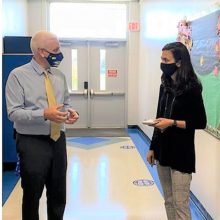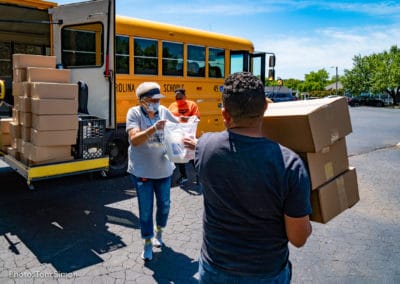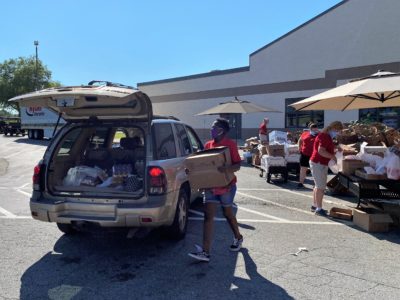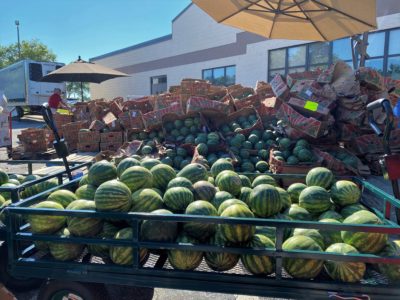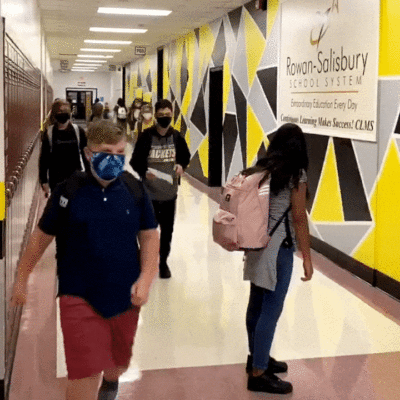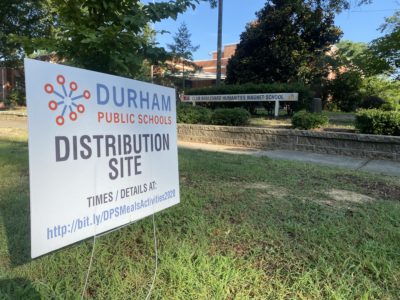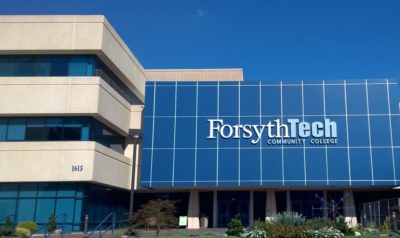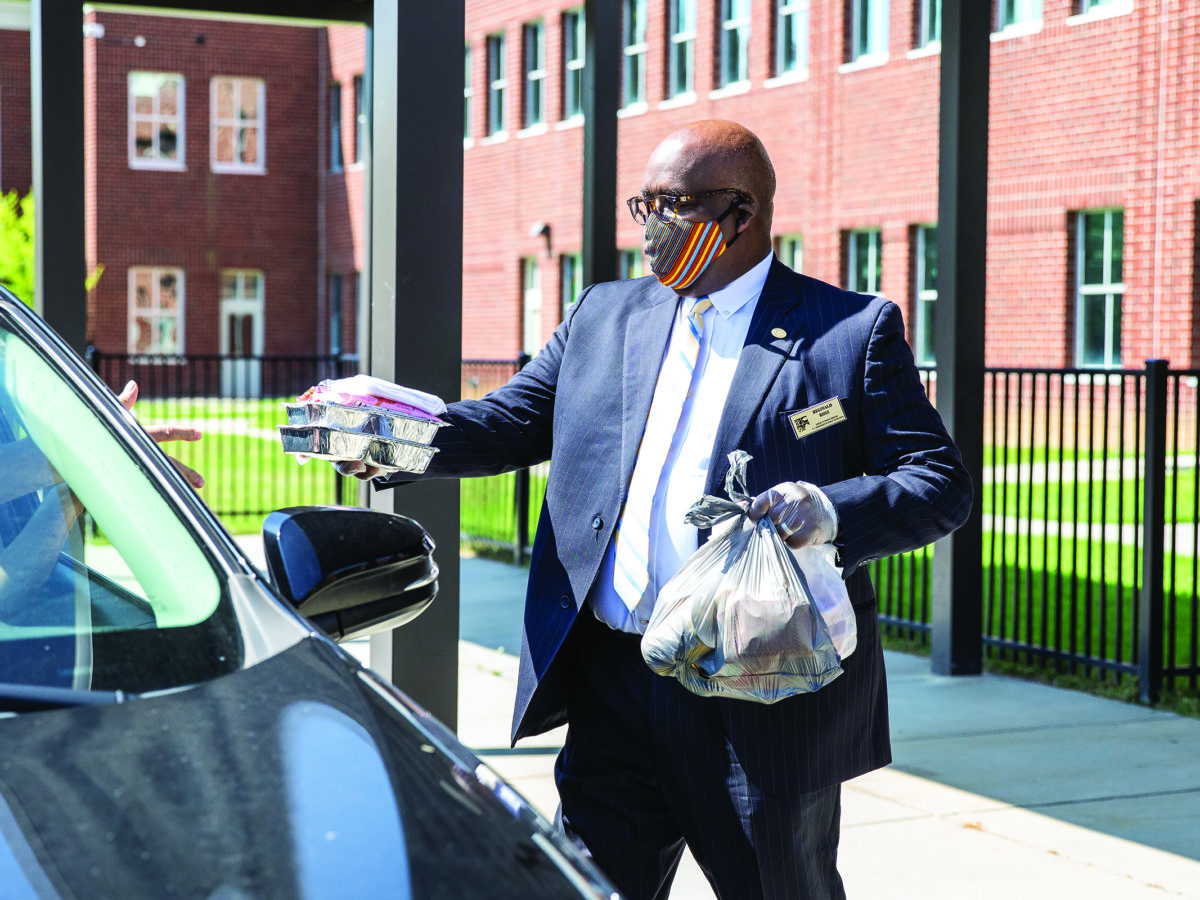

Reginald Ross, better known as Reggie, spent most of his early career in the quick food service industry. He held various positions with a national restaurant group that included Cinnabon and Church’s Chicken and later worked in operations for a Burger King franchise. He eventually opened his own restaurant, but it was a financial struggle. So in 2006, Ross applied to a school nutrition position in Charlotte-Mecklenburg Schools (CMS).
“And really from the first day, I just fell in love with school nutrition — having the opportunity to work with the students there at the middle school and feed hungry kids,” said Ross. “And my career has just taken off from there in ways that I never could have even imagined.”


After working as cafeteria manager at Coulwood Middle School, he was promoted to an area supervisor in CMS, where he worked for six and a half years. Since 2013, Ross has worked for the state Department of Public Instruction as an operations consultant for zone three, which includes an 11-county region around Charlotte.
For the last five years, Ross served on the board of directors for the national School Nutrition Association. SNA is a nonprofit organization that represents more than 55,000 members who “provide high-quality, low-cost meals to students across the country.” And in July, amid the continuing COVID-19 pandemic, Ross became president of SNA — the first male president since 1971, and only the fourth president who is a person of color.
“Recognized as the authority on school nutrition, SNA has been advancing the availability, quality and acceptance of school nutrition programs as an integral part of education since 1946.”
—School Nutrition Association website
What is it like to lead SNA amid the COVID-19 pandemic? And what are Ross’ goals for his tenure as president? We spoke with him to find out.
‘We knew that there were many kids who may go hungry.’
As with almost every other aspect of education, the COVID-19 pandemic has had a significant impact on school nutrition programs across the country.
Ross recalled that in early March, just before COVID-19 was declared a pandemic, SNA held its annual legislative action conference.
“Little did we know at that particular point how it was going to impact school nutrition. By Friday of that week, schools were closing,” said Ross. “And the question became: How are we going to feed kids?”
In his role as president-elect of SNA at the time, Ross set to work to ensure students would continue to receive the meals they depend on while school buildings were closed. And that’s been the continued focus of his work over the last six months.
“That’s what we have done in every way possible, in ways that we never even imagined. We have worked to make certain that students are fed,” he said.
Ross recalls the tremendous challenges that faced school nutrition employees in the early weeks of the pandemic. Safety protocols were being developed in real time as the world learned more about COVID-19, and personal protective equipment (PPE) was often hard to come by. But day after day, school nutrition departments worked to feed students.
“One of the things that we like to celebrate now is that prior to this, we knew how great our employees were, and they were heroes to us,” said Ross. “But now we see the world and the state knows that they are truly heroes for all the efforts and all the work that they’ve done.”
Question & Answer
Sorrells: What’s one thing you would want readers to know about school nutrition?
Ross: One of the things that I always emphasize to parents, families, and students is that their students’ success is really dependent upon getting nutritious meals. And our research really proves that if students eat breakfast, eat healthy lunches, that they are more successful in classes, there are less trips to the school nurses, they just have a brighter outlook on life.
Advocating for the future of school meals
Advocacy is a key role of the SNA that Ross hopes to continue to strengthen during his presidency.
Take the example of federal waivers that govern school meals. Since the beginning of the pandemic, Ross said SNA has worked with the United States Department of Agriculture (USDA) and Congress to ensure that school nutrition departments have all the tools they need to best serve students.
In March, the USDA authorized numerous waivers that granted flexibilities in the regulations governing school meals. For example, schools could provide meals at drop-off or drive-thru sites, parents could pick meals up without students being present, and multiple meals could be offered at once.
On Aug. 31, many of those waivers were set to expire – a move that would have further burdened school nutrition departments, many of which were already serving far fewer students in the new school year than they used to serve before the pandemic. The waivers expiring also would have made it more difficult for students to access school meals, especially during remote or hybrid learning models.
“Even in Charlotte-Mecklenburg, they were only serving maybe 10% or 11% of the meals that they normally served during that first week (of school),” said Ross.
So the SNA contacted the USDA and representatives in Congress to explain how important waiver extensions would be in allowing school nutrition departments to continue feeding students. And on Aug. 31, Secretary Sonny Perdue announced the extension of the waivers through as late as Dec. 31.
Now, Ross plans to continue the work that SNA is doing to secure those waivers through at least the end of the 2020-21 school year. He also praises the members of SNA for their individual advocacy efforts, noting that they worked diligently to contact their congressional representatives and request the waiver extensions.
“At one point, over the summer, we had over 100,000 letters that had gone to Congress and congressional representatives, and we’re very proud of that,” he said.
Beyond advocacy, Ross will focus on continuing to provide professional development opportunities to members to assist them through the challenging school year that lies ahead.
But despite those challenges, Ross has been impressed by the efforts that school districts have made to reach students who are in need. Whether it’s a hybrid model under plan B or an entirely remote model under plan C, he said North Carolina districts have implemented plans to ensure students are fed.
“Districts are coming up with ways to send food home for the week and making certain kids are fed, even on the weekends,” said Ross. “It’s just been incredible.”
